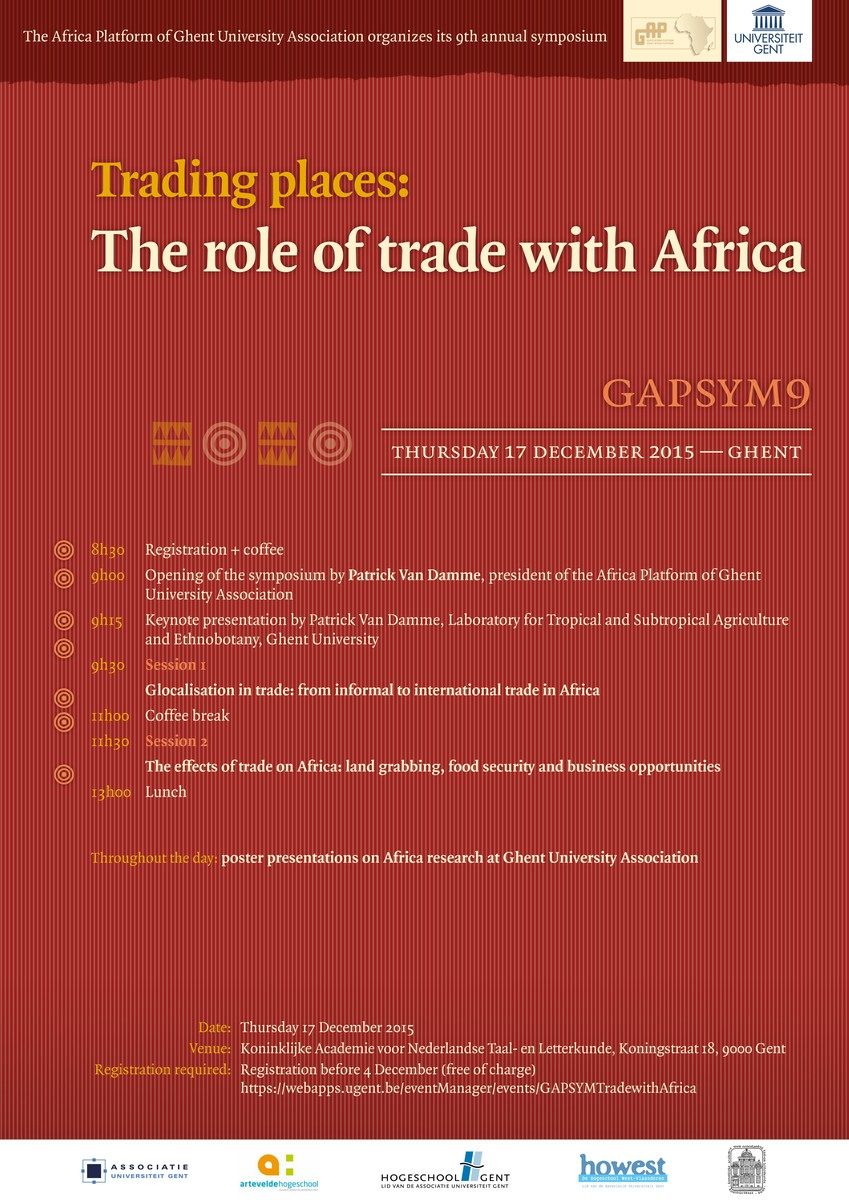Accueil > Actualités ultramarines > Colloque "Trading places : The role of trade with Africa" (GAPSYM9 – Gand, (...)
Colloque "Trading places : The role of trade with Africa" (GAPSYM9 – Gand, jeudi 17 décembre 2015)
Le 12 décembre 2015 à 18h47
Trading places : The role of trade with Africa
Thursday 17 December 2015, Ghent - Jeudi 17 décembre 2015 à Gand

Appel à communication, pour mémoire.
"The wealth of Africa has always drawn the attention of outsiders. Trade between Europe and Africa goes back to at least Roman times, when gold, salt, ivory, wheat and exotic animals were traded.
After the fall of the Roman empire, this trade continued by caravan routes across the Sahara. However, trade started in earnest after direct contact was established by European explorers, most famously Vasco da Gama. In the wake of European conquest and occupation, companies were lining up to discover this land of opportunity, as ‘trade follows the flag’. Not all this attention was equally welcome. The infamous ‘scramble for Africa’, which gained its full momentum after the Berlin conference of 1885, heralded the beginning of an era of colonization by European powers.
Today, Africa is trading more than ever. Private companies are no longer merely drawn to its wealth of natural resources, but increasingly targeting its burgeoning consumer market. Local involvement requires local presence, which is evident from fast growing foreign direct investment, which amounted to $57 billion in 2013 (UNCTAD, 2014). Increasing local presence means private companies are having a more direct impact on African society. This impact can be both positive and negative.
Increased use of ethical standards such as fair trade is widely believed to have positive impact on income and the environment. At the same time, media reports of land grabbing, oil spills, and mining strikes are increasing. There are clearly two sides to the coin.
With increasing involvement of private companies in areas traditionally considered the domain of public policy, often under the flag of corporate social responsibility, the line between trade and development is blurring. Businesses are increasingly partnering with NGO’s and local governments in so-called public-private partnerships for the development of infrastructure or to include vulnerable populations in their business models. The idea of business for development is gaining popularity in public policy circles, under the umbrella name of inclusive growth. In the wake of the financial crisis, mixing trade and development also serves national governments, which consider it an opportunity to use the aid budget to stimulate the business sector. Although trade is generally considered an opportunity to spur development and economic growth, many remain sceptic. A recent example of this are the comments of Merkel’s advisor on the recent Economic Partnership Agreements between
the European Union and African countries, which he considered to undermine the development agenda.
Trade is more than a simple exchange of goods for money. Trade requires investing in relationships and building mutual trust. Its impacts should not only be measured quantitatively, in terms of per capita income, but go beyond wealth creation, as through continued interaction it shapes ideas, ways of thinking and behavior. The impact of this interaction is reflected at all levels of society, as foreign ways become adopted and adapted by, and embedded in, local culture. These changes are endless
and far-reaching, including literature and arts, the way cities are planned and new buildings are designed, modes of governance, dietary patterns, appreciation and protection of the natural environment, and many more. Opening borders stimulates mutual exchange, but is certainly not without risks. This risk was painfully demonstrated by the reaction to the recent Ebola outbreak in West-Africa.
The opportunities and challenges for the relationship between Africa and Europe, created, sustained and intensified through trade, are far from clear and deserve further and greater attention. In the ninth edition of the symposium of the Ghent Africa Platform (GAPSYM9), we invite papers from all disciplines touching upon the impact of trade, and more generally economic globalization, on Africa and African society."


